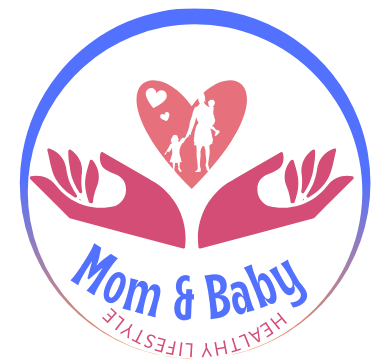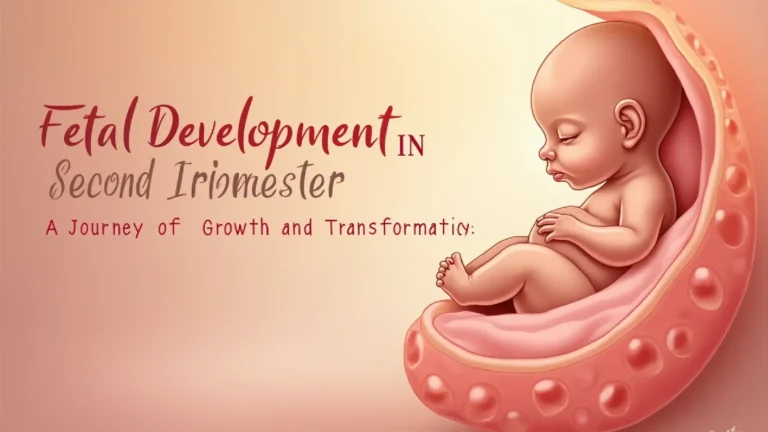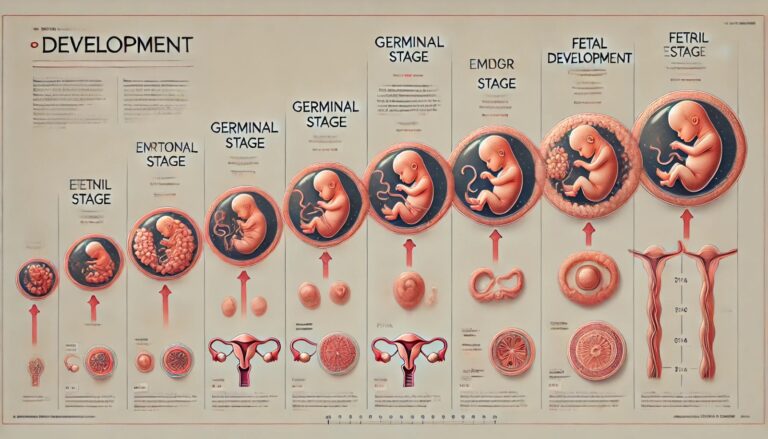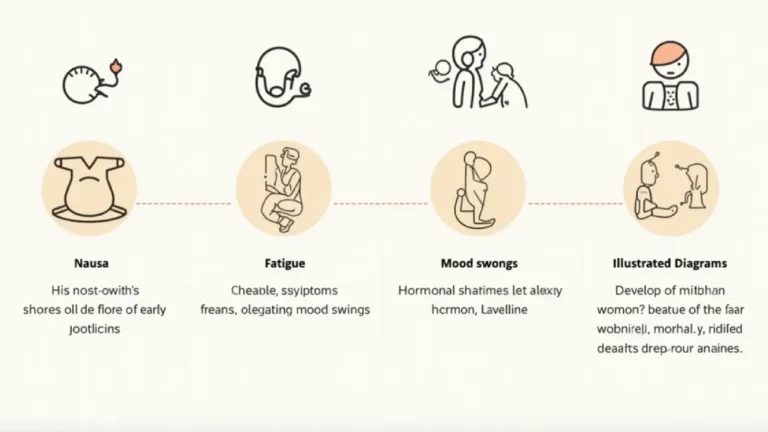First Trimester of Pregnancy Symptoms, Care Tips, and What to Expect
The first trimester of pregnancy is a time of remarkable changes for both you and your baby. Spanning the first 12 weeks, this phase lays the foundation for a healthy pregnancy and involves critical fetal development. Knowing the common pregnancy symptoms is important. Prenatal care is also essential for a healthy pregnancy. Staying healthy can help you feel more confident during this journey.
What Is the First Trimester of Pregnancy?
Table of Contents
The first trimester starts on the first day of your last period. It lasts until the 13th week of pregnancy.
It may seem surprising, but your pregnancy begins before conception. Healthcare providers calculate gestational age from the start of your last cycle. By the time you confirm your pregnancy, you’re likely already several weeks along.
Understanding Pregnancy Weeks and Fetal Development

Weeks 1 to 4: Setting the Stage
During the first week of pregnancy, your body prepares for ovulation, which typically occurs around the second week. After fertilization, the egg moves down the fallopian tube. It divides into cells while traveling to the uterus.
By the third week, the fertilized egg attaches to the uterine lining. This starts the production of hormones that support early pregnancy.
Weeks 5 to 8: Rapid Growth Begins
By the fifth week, significant fetal development occurs. The embryo forms its brain and spinal cord, circulatory system, and the amniotic sac. During this stage, tiny buds emerge that will grow into fingers and toes. The umbilical cord develops to supply the baby with nutrients and oxygen.
Weeks 9 to 12: Transitioning to a Fetus
By the ninth week of pregnancy, the embryo is officially called a fetus. Major organs like the digestive systems, liver, and kidneys start functioning. The baby’s fingers and toes become more defined, and you may see subtle movements on an ultrasound. By the end of the 12 weeks, your baby is about 3 to 4 inches long roughly the size of a plum.
Common Pregnancy Symptoms in the First Trimester

The hormonal shifts and physical changes in early pregnancy can bring about various symptoms of pregnancy. Some of the most common first-trimester experiences include:
- Morning Sickness
- Morning sickness is a sign of early pregnancy. It can cause nausea at any time of the day. This happens due to rising hormone levels. Eating small, frequent meals can help alleviate discomfort.
- Mood Swings: Hormonal surges may cause fluctuating emotions, ranging from joy to anxiety. Open communication with loved ones can help you manage these changes.
- Fatigue: As your body works to support fetal development, you may feel unusually tired. Rest is essential during this phase.
- Sore Breasts: Hormones can make your breasts tender and swollen as they prepare for milk production.
- Frequent Urination: The expanding uterus begins to put pressure on your bladder, making bathroom visits more frequent.
- Skin Changes: Hormonal activity can lead to oily skin, acne, or a healthy glow.
Why Is Prenatal Care Crucial During the First Trimester?
Prenatal care is vital to ensuring a healthy pregnancy for both you and your baby. Scheduling your first prenatal visit early allows your pregnancy care provider to assess your health and discuss important steps for staying healthy.
What Happens at Your First Prenatal Visit?
Your healthcare provider will perform various checks, including:
- Reviewing your medical history and assessing any potential risks.
- Performing a physical exam and checking hormone levels.
- Monitoring your weight gain and blood pressure.
- Conducting tests, such as blood work and screenings for infections.
- Confirming your baby’s heartbeat using a transvaginal ultrasound.
Regular prenatal care appointments throughout your pregnancy will help monitor your baby’s progress and address any concerns.
Tips for Staying Healthy in Early Pregnancy
Nutrition and Vitamins
Eating a balanced diet is essential for fetal growth and development. Incorporate nutrient-rich foods like leafy greens, lean proteins, and whole grains. Taking a prenatal vitamin with folic acid supports the development of your baby’s brain and spinal cord.
Physical Activity
Staying active during the first trimester can boost energy levels and improve your overall health. Low-impact exercises like walking or prenatal yoga are excellent options. Listen to your body and avoid activities that put pressure on your abdomen.
Getting Enough Rest
Fatigue is common in early pregnancy. Allow yourself plenty of rest to accommodate the increased energy demands of your body. Short naps and a consistent sleep schedule can help combat tiredness.
What Should You Avoid in the First Trimester?
To ensure a healthy pregnancy, steer clear of activities and substances that may pose risks to you or your baby:
- Alcohol and Tobacco: These substances can interfere with fetal development and increase the risk of complications.
- Certain Foods: Avoid raw fish, unpasteurized dairy, and high-mercury seafood to prevent exposure to harmful bacteria and toxins.
- Overexertion: Skip high-impact sports or activities that could cause injury.
- Hot Environments: Saunas and hot tubs can raise your core body temperature to unsafe levels.
Symptoms to Monitor and When to Call Your Provider

While many symptoms are normal, some warrant immediate attention. Contact your pregnancy care provider if you experience:
- Heavy bleeding or severe cramping.
- Persistent vomiting that prevents hydration or eating.
- A high fever over 100.4°F.
- Swelling in your hands, face, or legs.
- Blurred vision or dizziness.
Prompt medical care can help address potential issues and ensure a smooth pregnancy.
The first trimester of pregnancy is an exciting and pivotal time. From the first week of pregnancy to the end of 12 weeks, your body is undergoing incredible changes to support your baby’s growth. By understanding common symptoms, embracing healthy habits, and attending regular prenatal visits, you can navigate this trimester with confidence and optimism. Stay informed, listen to your body, and lean on your pregnancy care provider for guidance as you embark on this amazing journey.








One Comment